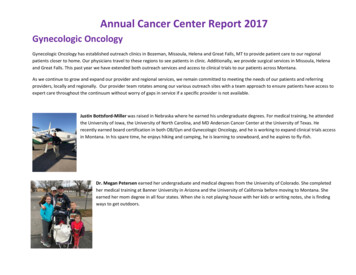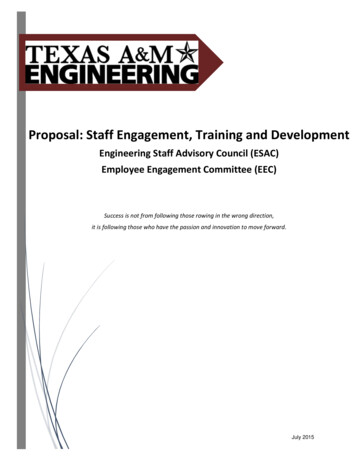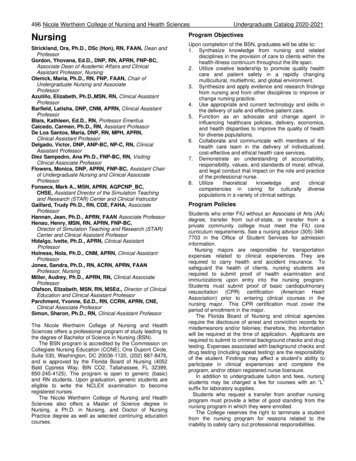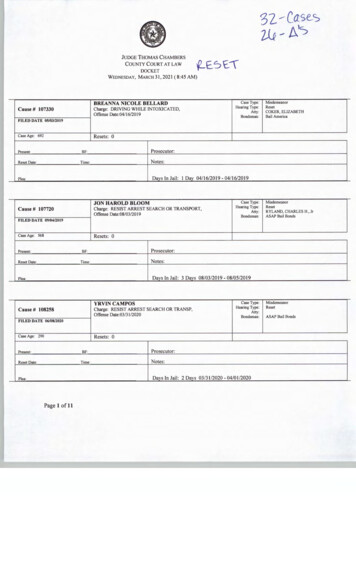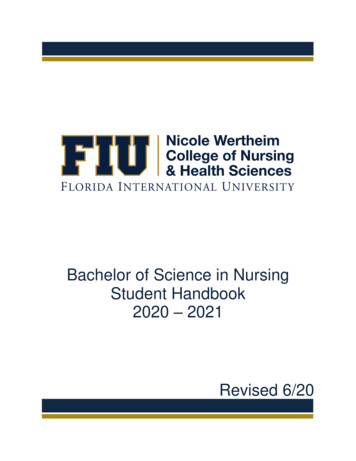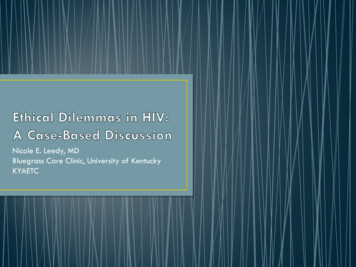
Transcription
Nicole E. Leedy, MDBluegrass Care Clinic, University of KentuckyKYAETC
Review examples of ethical dilemmas encountered in practice ofHIV medicine Discuss response, impact, strategies, legal implications Learn vocabulary as applies to individual scenarios
No financial disclosures I am not an ethicist. I am not a lawyer.
1) Majority of today’s cases are from actual scenarios from thehospital, clinic or institution; be respectful of any personaldetails that may come out in today’s discussion. 2) Emotionally charged cases with polarizing opinions;everyone’s opinion matters!
Autonomy The right of individuals to self-determination The ability to make informed decisions about health matters May conflict with beneficence Beneficence Actions that promote the well-being of others Serve the best interest of patients Non-maleficence Primun non nocere– first do no harm Not only don’t do things that we know to be harmful, but avoid things thatmight be harmful
You are conducting a routine follow up visit with a long-termHIV patient. His most recent (4 months prior) CD4 is 800 andviral load undetectable for 6 months on a single-tablet ARVregimen. He is married and lives in a small town in eastern KY. He plans to go to the laboratory to complete lab work after thevisit. When you enquire, if he would like to have his lab resultsmailed to him, he says: “Oh no! I don’t want my wife to find out Ihave HIV.” You note that his chart is flagged with the following designationin red from another clinic: “Combative Patient”
Ethical issues?Can we disclose to his wife? Should we?What are the legal implications, if any, for HIV/STD disclosure?How would you counsel this patient?
Emotionally charged Concerns include: Privacy Discrimination Loss Agenda Clinician viewpoint—public health, identifying/treating cases Patient viewpoint—maintaining privacy, relationships, fear
Varies by state Specific provision forpartner/spouse notification (notin KY) Spousal/partner notificationstrategies (state dependent) Person with HIV required to revealname of partner or spouse Provider or Health Dept. maycontact person at risk forexposure (Kentucky) Permission to disclose name ofsource to spouse/partner Permissible/MandatoryDisclosure School officialHealth care provider (KY-P)Penal institution (KY-P)Insurance companyBlood bank/organ donorBlood or organ recipientHMO/health care or mentalhealth facility (KY-P) Research (KY-P) Court order/subpoena (KY-P) Penalties for impermissibledisclosure Criminal/Civil (KY-P)Adapted from Anderson et al. Ethics in HIV-Related Psychotherapy, 2001; ACLU Lesbian & Gay Rights Project 2008
STIs in Kentucky Legally includes: HIV/AIDS, syphilis, gonorrhea, genital herpes, chancroid,granuloma inguinale, non-gonococcal urethritis, mucopurulent cervicitis,chlamydia and “any STD designated by the Kentucky Cabinet of Health andFamily Services” (KRS 214.410) Wanton Endangerment 1st degree—conduct that shows an extreme indifference to the value ofhuman life and creates a substantial risk of death or serious physicalinjury (Class D felony) (KRS 508.060) Has been applied in court in case of HIV/AIDS in KY 2nd degree—conduct that creates a substantial danger of physical injuryto another person (Class A misdemeanor) (KRS 508.070) Known infection with an STD (other than HIV/AIDS) and unprotected sex withoutdisclosure Voluntary impairment, such as intoxication, that leaves a person unawareof risk does not mitigate the conduct (KRS 501.020(3))
Blood and TissueDonation Prostitution Known HIV-positive ANDinformed may passinfection via blood, organ,tissue donation and yetproceeds to donate Wanton Endangerment(KRS 311.990(24)) Class D felony regardlessof intent to transmitAdapted from HIV Center for Law and Policy Ending and Defending Against HIV Criminalization, 2015 If convicted must undergoscreening for HIV (KRS214.420) Known positive for STD orHIV/AIDS and commitsprostitution AND knew thatcould pass it to others(Class D felony ifHIV/AIDS)
Class D Felony Post-incarceration supervision 1-5 years incarceration 1000- 10,000 or double the gain from the commission of the offensewhichever is greater 532.060(2)(d), 534.030(1)
Trust Practice Resources from AIDS.gov Grant-based programs “CLEAR”(Choosing Life: Empowerment! Action! Results!)—CDC intervention Relate experiences around disclosure Pros and cons of disclosure Identify barriers and strategies to address Role play
You are contacted by the School of Dentistry regarding astudent accepted into the incoming class for next fall regardinghis HIV status. Disclosed that recently diagnosed with HIV. Found out afteracceptance to school. How should they proceed?
Ethical issues? How does this impact his matriculation into dental school? Who should be notified of his status?
58 yo trauma surgeon recently hired by University as faculty Receive call from employee health that he reports a pastmedical history of Hepatitis C An antibody screen is positive; viral load and genotypepending
Ethical issues? Should he be allowed to perform surgeries at your institution? Whom, if any, should be informed of his diagnosis?
Four factors that impact risk (according to federal antidiscrimination case-law) The nature of the risk (how the disease is transmitted)The duration of the risk (how long the carrier is infectious)The severity of the risk (the potential for harm to third parties)The probability that the disease will be transmitted and cause harm
Occupation—get specific State of disease Available treatments
Four factors that impact risk (according to federal antidiscrimination case-law) The nature of the risk (how the disease is transmitted) HIV: sexual contact, blood, breast milk, vertical HCV: blood, sexual contact, vertical The duration of the risk (how long the carrier is infectious) HIV: potentially lifelong, but varies on treatment HCV: Genotype? Can they be treated? The severity of the risk (the potential for harm to third parties) The probability that the disease will be transmitted and cause harm
Asymptomatic/symptomatic persons with HIV/AIDS protectedState licensing/public trade schools (Title II)Private trade schools (Title III)Cannot exclude persons with HIV/AIDS because of status unlessexhibit a “direct threat” that cannot be eliminated or reducedto an acceptable level by reasonable modifications to theentity’s polices, practices or procedures Must base on individual and rely on current medical evidence altopics/hiv/factsheethivlincense.pdf
Remember confidentiality!Balance public health vs needs of individualGroup approachResources: AIDS.gov SHEA guidelines Colleagues
You are reviewing labs from clinic visits over the last week. Younote an inadvertent order for a urine drug screen on a longterm patient. His only controlled medication per your historyand medical records is ketorolac. On your review, you note thepresence of amphetamines and narcotics. He is a registerednurse.
Ethical issues? What should you do next?
Impairment Medical Psychiatric Substance Also Emotionally Charged Feelings of betrayal/uncertainty Licensure Patient safety
Kentucky Physician Health Foundation Assists KY licensed physicians with addictive disease, physical/mentalillness Does not satisfy requirements of reporting Kentucky Board of Medical Licensure Must receive a report within 10 days of obtaining direct knowledge ofimpairment
The Florida Experience FS 464.018 (Nurse Practice Act)(k) Failing to report to the department any person who the licensee knowsis in violation of this part of the rules of the department or the Board;however, if the licensee verifies that such person is actively participating ina board-approved program for the treatment of a physical or mentalcondition, the licensee is required to report such person only to animpaired professionals consultant. “Intervention Project for Nurses (IPN)” If only reported to IPN, agrees to participate and successfullycompletes the program, the file is closed and held in confidence withno disciplinary action.Floridasnursing.gov
Physician contacted our risk management department forguidance Duty to inform board of nursing Advised likely to have better outcome for employment and sanctions ifpatient self-reports Called patient Informed that would give opportunity to report prior to physicianreporting Patient informed board (15 minutes prior to provider) Unfortunately lost employment Entered rehabilitation; now with new job
Not “if” but “when” Practice! Practice! Practice! Get help!
a board-approved program for the treatment of a physical or mental condition, the licensee is required to report such person only to an impaired professionals consultant . "Intervention Project for Nurses (IPN)" If only reported to IPN, agrees to participate and successfully




